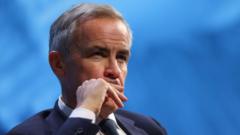Trudeau's announcement to step down after nine years has opened the door for potential successors, with Carney expressing interest alongside other notable candidates.
Mark Carney Eyes Potential Leadership Bid to Succeed Trudeau

Mark Carney Eyes Potential Leadership Bid to Succeed Trudeau
Former central banker contemplates entry into the Liberal Party leadership race following Trudeau's resignation.
In a significant political shift for Canada, Mark Carney, the ex-governor of both the Bank of Canada and the Bank of England, has announced he is "considering" stepping into the race to succeed Justin Trudeau as leader of the Liberal Party. This comes in the wake of Trudeau's recent declaration that he will resign after nine years as prime minister amid declining party support and unfavorable polling.
Carney, who is 59, joins a growing list of potential candidates that includes former deputy prime minister Chrystia Freeland and current Transport Minister Anita Anand. Trudeau has stated that he will remain in his role until the Liberal Party selects a new leader. Meanwhile, the Canadian Parliament has been prorogued, scheduled to resume on March 24, and the party aims to finalize its leadership decision by that date.
Highlighting their support for Carney, Trudeau remarked that he has long sought to recruit him to his cabinet, even suggesting he would be an "outstanding addition" to government, especially in times when Canada requires strong political figures.
With a notable career as a central banker, Carney commanded significant influence in navigating two major economies through critical periods, such as the global financial crisis and the economic ramifications of Brexit. Beyond economics, Carney has focused on climate issues as the United Nations special envoy for climate action, advocating for ambitious goals like net-zero emissions.
Currently, the Liberal Party faces pressing challenges, including a federal election that must occur by October, with the odds favoring an earlier vote. The opposition Conservative Party, led by Pierre Poilievre, enjoys a commanding lead in polls, increasing the urgency for the Liberals to establish new leadership and strategy.
Carney’s potential candidacy, alongside others, brings a mix of expertise and political aspirations to the forefront, with significant implications for Canada's policy directions moving forward, especially concerning environmental legislation and economic recovery.
Carney, who is 59, joins a growing list of potential candidates that includes former deputy prime minister Chrystia Freeland and current Transport Minister Anita Anand. Trudeau has stated that he will remain in his role until the Liberal Party selects a new leader. Meanwhile, the Canadian Parliament has been prorogued, scheduled to resume on March 24, and the party aims to finalize its leadership decision by that date.
Highlighting their support for Carney, Trudeau remarked that he has long sought to recruit him to his cabinet, even suggesting he would be an "outstanding addition" to government, especially in times when Canada requires strong political figures.
With a notable career as a central banker, Carney commanded significant influence in navigating two major economies through critical periods, such as the global financial crisis and the economic ramifications of Brexit. Beyond economics, Carney has focused on climate issues as the United Nations special envoy for climate action, advocating for ambitious goals like net-zero emissions.
Currently, the Liberal Party faces pressing challenges, including a federal election that must occur by October, with the odds favoring an earlier vote. The opposition Conservative Party, led by Pierre Poilievre, enjoys a commanding lead in polls, increasing the urgency for the Liberals to establish new leadership and strategy.
Carney’s potential candidacy, alongside others, brings a mix of expertise and political aspirations to the forefront, with significant implications for Canada's policy directions moving forward, especially concerning environmental legislation and economic recovery.


















